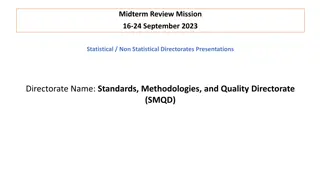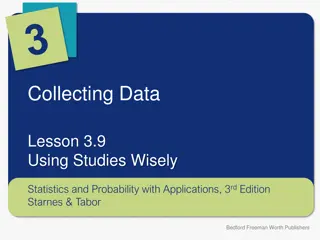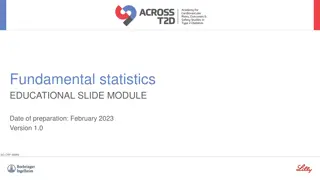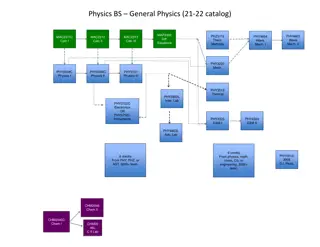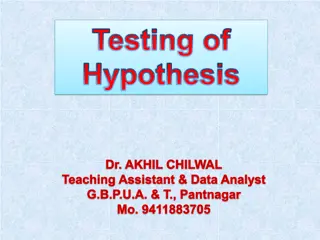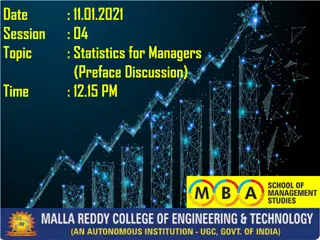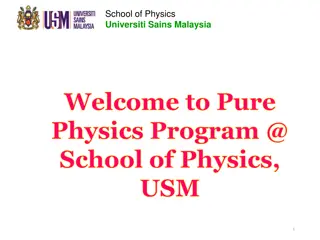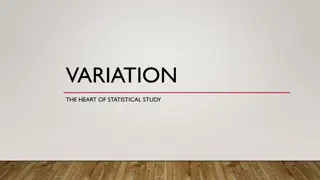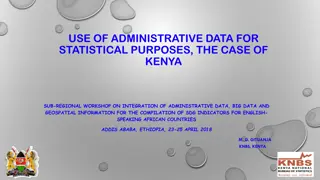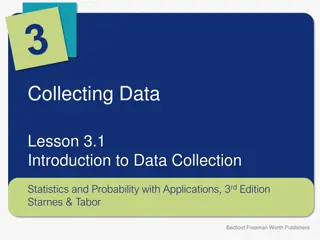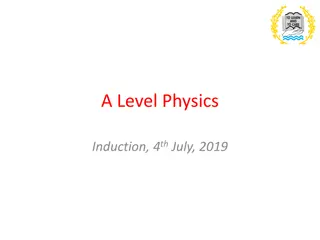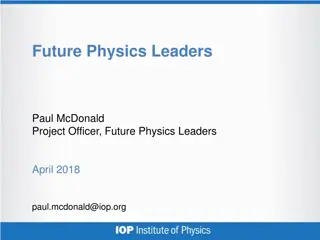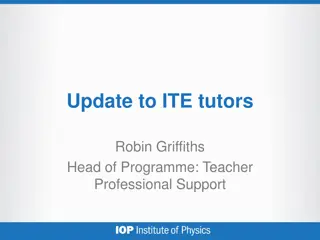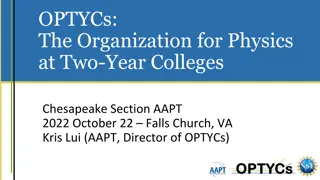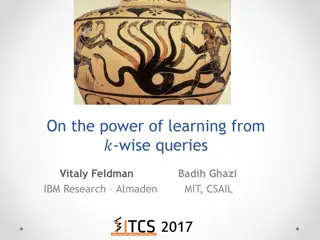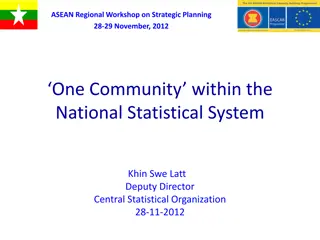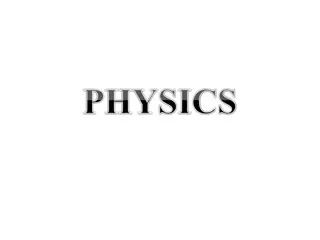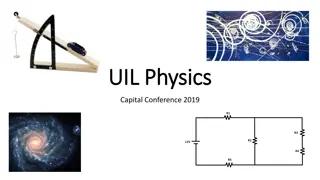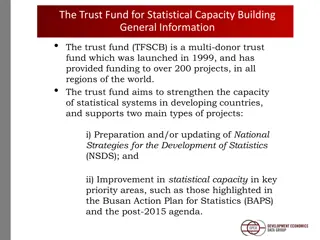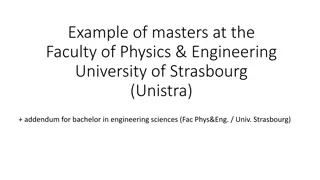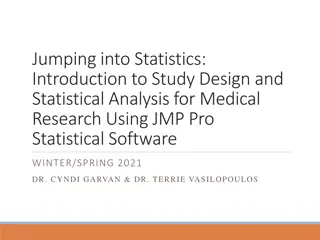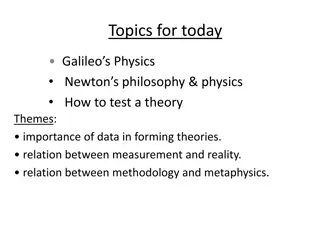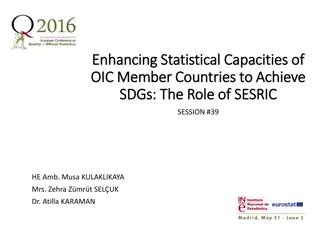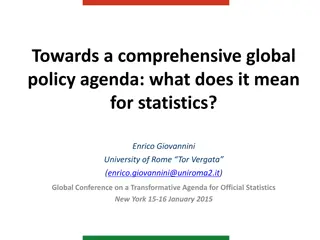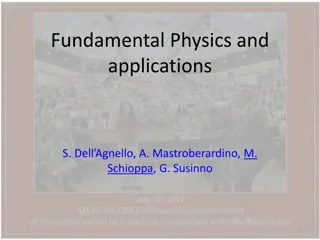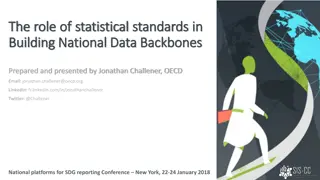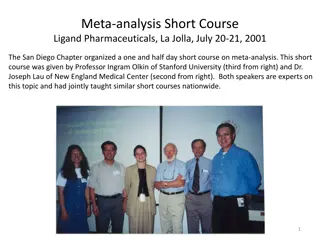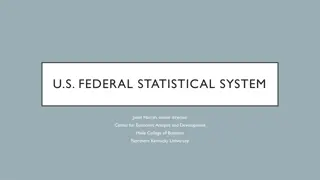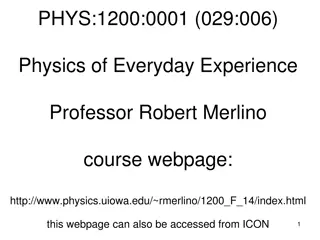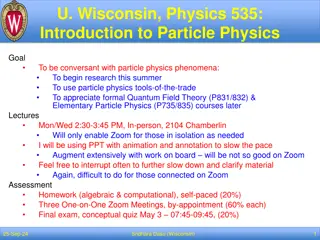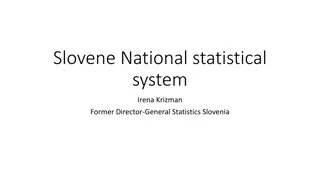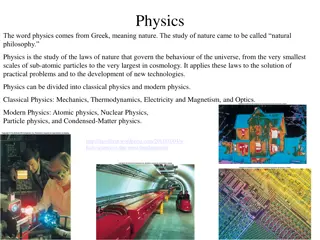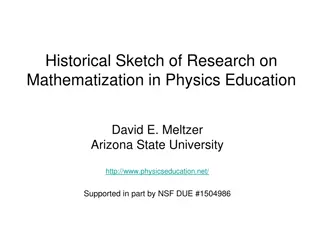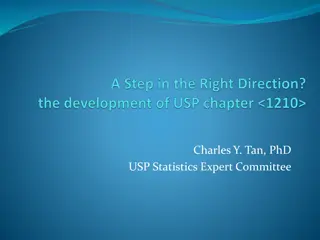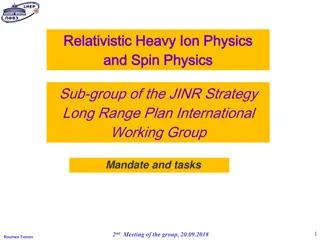Standards, Methodologies, and Quality in Statistical Programs and Services
This presentation highlights the role of the Standards, Methodologies, and Quality Directorate in overseeing statistical programs and services. It covers topics such as quality assurance, sampling frames, statistical classifications, and user satisfaction surveys. The directorate collaborates with v
1 views • 13 slides
Biostatistician Expert Offering Statistical Support and Training at CAMH
Marcos Sanches is a biostatistician at Biostatistic Core, CAMH, dedicated to enhancing the statistical quality of research projects. With expertise in various study designs, statistical techniques, and software, Marcos provides support throughout the project lifecycle, from grant applications to dat
5 views • 7 slides
Understanding the Scope of Inference in Statistical Studies
Statistical studies require careful consideration of the scope of inference to draw valid conclusions. Researchers need to determine if the study design allows generalization to the population or establishes cause and effect relationships. For example, a study on the effects of cartoons on children'
1 views • 15 slides
Understanding Statistical Methods for Clinical Endpoints in Diabetes Research
This educational slide module delves into fundamental statistics for analyzing clinical endpoints in diabetes research. It covers the choice of statistical methods, the distinction between statistical and clinical significance, and the importance of different endpoints in evaluating clinical benefit
1 views • 37 slides
Physics Bachelor's Degree Specializations Overview
Explore different specializations within a Physics Bachelor's degree program for the 2021-2022 academic year, including general physics, astronomy, computational physics, materials physics, and optics and lasers. Each specialization offers a unique set of courses and opportunities for students inter
2 views • 9 slides
Understanding Hypothesis Testing in Statistical Analysis
Statistical analysis aims to make inferences about populations based on sample data. Hypothesis testing is a crucial aspect where decisions are made regarding accepting or rejecting specific values or parameters. Statistical and parametric hypotheses, null hypotheses, and decision problems are key c
1 views • 34 slides
Statistics for Managers: A Comprehensive Course Overview
This course aims to equip managers with statistical skills to analyze data effectively and make informed decisions in various management areas. It covers topics such as measures of central tendency, statistical models, and the importance of statistical analysis in improving business decisions. The i
2 views • 15 slides
Explore the Pure Physics Program at School of Physics, USM
Delve into the Pure Physics Program offered at the School of Physics, Universiti Sains Malaysia (USM). Learn about the undergraduate programs available, graduation requirements, and specialization decision tree. Discover how to achieve success in the field of physics at this esteemed institution.
3 views • 44 slides
Understanding Degrees of Freedom in Statistical Models
Exploring the concept of degrees of freedom in statistical modeling, this presentation discusses the importance of having adequate degrees of freedom for model fitting and interpretation. It compares different models with varying degrees of freedom, illustrating how a null model with zero parameters
0 views • 27 slides
Understanding Variation in Statistical Studies
Variability is key in statistical studies, shaping the essence of statistical analysis. Students often struggle to grasp the concept of variability, despite being taught statistical methods. The term "variation" takes on different meanings in various statistical contexts, presenting challenges in co
2 views • 54 slides
Utilizing Administrative Data for Statistical Analysis in Kenya's National Statistical System
Kenya National Bureau of Statistics (KNBS) employs administrative data for statistical purposes, as highlighted in the sub-regional workshop on integrating administrative data, big data, and geospatial information for compiling SDG indicators. The legal and institutional framework, data collection m
0 views • 21 slides
Introduction to Data Collection & Statistics: Understanding Statistical Questions, Population, and Sampling
This material introduces the fundamental concepts of data collection and statistics. Learning objectives include distinguishing statistical questions, identifying populations and samples, and understanding the difference between observational studies and experiments. It discusses the process of stat
1 views • 14 slides
A Level Physics Course Outline and Structure
The A Level Physics course is outlined, detailing the topics covered in Year 12 and A2. The course structure includes three exams at the end of the A2 course and a practical certificate of competence. Topics range from particles and radiation to fields, nuclear physics, and practical skills assessme
0 views • 16 slides
Enhancing Physics Education: Future Physics Leaders Initiative
The Future Physics Leaders program, a national education project managed by the Institute of Physics, aims to support specialist physics teachers, Newly Qualified Teachers (NQTs), and non-specialist physics teachers in England. By offering professional development, matched timetabling, and mentoring
0 views • 10 slides
Empowering Physics Teachers: Innovations in Professional Development
Discover the latest updates and initiatives in physics teacher training and support programs led by Robin Griffiths and the Institute of Physics (IOP). From stimulating physics networks to nurturing future physics leaders, these projects aim to enhance teaching practices, support disadvantaged stude
7 views • 11 slides
OPTYCs: Organization for Physics at Two-Year Colleges - Programs and Initiatives
OPTYCs (Organization for Physics at Two-Year Colleges) is a community fostering collaboration and professional development among physics educators at two-year colleges. They offer various programs like Continuing Professional Development Workshops, New Faculty Development Series, and Leadership Inst
0 views • 17 slides
Exploring the Power of Wise Queries in Statistical Learning
Dive into the world of statistical learning with a focus on the impact of wise queries. Discover how statistical problems are approached, the significance of statistical queries, and the comparisons between wise and unary queries. Explore the implications for PAC learning and uncover key insights in
0 views • 8 slides
Understanding IBM SPSS for Statistical Analysis
IBM SPSS, formerly known as Statistical Package for the Social Sciences, is a powerful software package for statistical analysis used by researchers across various industries. Developed in the late 1960s, SPSS offers features for data management, statistical analysis, and data documentation. It simp
1 views • 13 slides
Overview of Myanmar Statistical System and Central Statistical Organization
The Myanmar Statistical System operates as a decentralized system with the Central Statistical Organization playing a crucial role at the national level. Various surveys and data collection efforts are undertaken by different ministries and agencies, coordinated by the CSO. The CSO compiles and pres
0 views • 18 slides
Comprehensive Overview of GES Physics Syllabus Aligned with Khan Academy Resources
Explore the GES Physics syllabus divided into Mechanics, Thermal Physics, Waves, Electricity and Magnetism, Atomic and Nuclear Physics, and Electronics. The syllabus covers a wide range of topics from introductory physics concepts to advanced topics in thermodynamics, optics, electromagnetism, quant
1 views • 5 slides
UIL Physics Capital Conference 2019 Topics & Questions Overview
The UIL Physics Capital Conference 2019 featured various physics topics and questions ranging from teaching quantum physics to dogs to fields like astronomy, measurement, uniform motion, forces, energy, and more. The event covered a wide array of physics concepts, and the directed study text focused
1 views • 25 slides
The Trust Fund for Statistical Capacity Building
The Trust Fund for Statistical Capacity Building (TFSCB) is a multi-donor trust fund launched in 1999, supporting over 200 projects worldwide to strengthen statistical systems in developing countries. It focuses on national strategy development and improving statistical capacity in key priority area
1 views • 5 slides
Master's Programs at University of Strasbourg - Faculty of Physics & Engineering
Explore the Master's programs offered at the Faculty of Physics & Engineering, University of Strasbourg (Unistra) with specializations in Astrophysics, Condensed Matter Physics, Radiation Physics, Subatomic Physics, and Cell Physics. The curriculum includes a strong theoretical background, specializ
2 views • 13 slides
Jumping into Statistics: Study Design & Statistical Analysis in Medical Research
Explore the fundamentals of study design & research methodology, learn to select appropriate statistical tests, and practice statistical analysis using JMP Pro Software. Topics include research question formulation, statistical methods, regression, survival analysis, data visualization, and more. Un
0 views • 31 slides
Understanding Galileo's Physics and Newton's Philosophy
Explore the intersection of Galileo's terrestrial physics experiments, Galileo's physics discoveries, and Newton's philosophy and physics. From challenging Aristotelian views to introducing concepts like equivalence, inertia, and relativity, delve into the evolution of scientific thought on measurem
0 views • 22 slides
Enhancing Statistical Capacities of OIC Member Countries to Achieve SDGs: The Role of SESRIC
This presentation discusses the importance of enhancing statistical capacities in OIC member countries to achieve Sustainable Development Goals (SDGs), with a focus on the role of SESRIC. It covers the evolution of statistical definitions, the use of Statistical Capacity Index (SCI) for analysis, an
2 views • 17 slides
Enhancing Global Statistical Systems for Sustainable Development
The post-2015 development agenda emphasizes the need for a comprehensive global policy agenda, impacting statistical systems worldwide. This agenda seeks to improve data collection, coordinate international statistical efforts, and enhance national statistical systems by 2020 to support the Sustaina
0 views • 23 slides
Advances in Experimental Particle Physics and Metrology Technologies
This collection of images and text highlights the essential aspects of fundamental physics experiments, particle physics detectors, and the Atlas ITk project. It also focuses on the importance of metrology for physics and satellite experiments, with a specific emphasis on laser technologies. The con
0 views • 11 slides
Exploring Physics: An Intriguing Journey Through the World of Science
Delve into the realm of physics, where inquisitive minds seek answers to the mysteries of the universe. Discover the various areas of study, from mechanics to atomic physics, and unravel the intricate course structure. Expect a challenging yet rewarding experience as you delve into the elite world o
0 views • 12 slides
Role of Statistical Standards in Building National Data Backbones
The role of statistical standards in constructing national data backbones is crucial for efficient data dissemination and reporting, especially in the context of Sustainable Development Goals (SDGs). Statistical standards guide the orchestration of information flows within a national statistical net
0 views • 22 slides
Statistical Events in San Diego Area (2001-2003)
Several significant statistical events took place in the San Diego area between 2001 and 2003, featuring renowned speakers and experts in the field. These events covered topics such as meta-analysis, global atmospheric changes, statistical trends, and annual statistical career days. The gatherings p
0 views • 12 slides
Overview of the U.S. Federal Statistical System and Census Geography
The U.S. Federal Statistical System comprises 13 principal statistical agencies responsible for collecting and analyzing data across various sectors. The system includes agencies like the Bureau of Economic Analysis, Bureau of Labor Statistics, and U.S. Census Bureau. Geographic identifiers (GEOIDs
0 views • 94 slides
Understanding Physics in Everyday Life: Course Overview
Explore the fascinating world of physics through everyday experiences in this course by Professor Robert Merlino. Discover the scientific principles behind common phenomena, from the physics of technology to the mysteries of light, electricity, and more. Develop critical thinking skills, learn basic
0 views • 14 slides
Introduction to Particle Physics at U. Wisconsin: Physics 535
Dive into the captivating world of particle physics with Physics 535 at University of Wisconsin. Explore phenomena, delve into Quantum Field Theory and Elementary Particle Physics, and prepare for research work. Engage in in-person lectures supplemented by Zoom for those in isolation. Utilize textbo
0 views • 8 slides
Slovene National Statistical System Overview
The Slovene National Statistical System comprises institutions like the Statistical Office of the Republic of Slovenia and various advisory committees responsible for producing official statistical data following European and UN standards. It emphasizes neutrality, objectivity, transparency, and con
0 views • 9 slides
Exploring Physics: From Classical Mechanics to Relativistic Quantum Mechanics
Physics, derived from Greek meaning "nature," encompasses the study of the laws governing the universe at all scales. Classical physics delves into mechanics, thermodynamics, electricity, and optics, while modern physics covers atomic, nuclear, and particle physics. Relativistic Quantum Mechanics co
0 views • 14 slides
Historical Sketch of Mathematization in Physics Education: Evolution and Challenges
The historical progression of mathematization in physics education from high school to college level is explored, tracing back to the early 1900s. The shift towards quantitative measurement and mathematical problem-solving in high school physics instruction led to debates over de-mathematization, im
0 views • 20 slides
Statistical Tools for Method Validation in USP General Chapter 1210
In the USP General Chapter 1210, Statistical Tools for Method Validation are outlined, serving as a companion to the validation of Compendial Procedures. The chapter covers important topics like Accuracy, Precision, Linearity, LOD, LOQ, and range. It emphasizes statistical tools such as TOST, statis
0 views • 22 slides
Welcome to Physics 100! Basic Concepts of Physics
This physics course, led by Instructor Neepa Maitra, covers fundamental concepts of physics based on Paul G. Hewitt's book. It includes topics such as Newton's laws, momentum, energy, rotation, and more. The course structure, grading system, and important notes are outlined, along with details on cl
0 views • 25 slides
Relativistic Heavy-Ion and Spin Physics Sub-group Mandate and Tasks
The Relativistic Heavy-Ion and Spin Physics Sub-group, part of the JINR Strategic Long-Range Plan, is tasked with identifying scientific priorities and research infrastructure to maintain JINR's global scientific leadership. Members include experts from various institutions collaborating to develop
0 views • 8 slides
